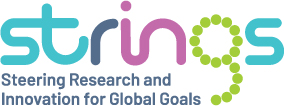During the summer, STRINGS co-investigator Dr Tommaso Ciarli took part in the UN Department of Economic and Social Affairs (UN DESA) Division for Inclusive Social Development (DISD)’s Expert Group Meeting on the Socially just transition towards sustainable development: The role of digital technologies on social development and well-being of all, alongside Prof Maria Savona from the Science Policy Research Unit (SPRU).
The meeting aimed to provide the UN Commission for Social Development with concrete, evidence-based policy recommendations ahead of its meeting in February 2021.
Tackling the misalignment of science, technology and innovation and societal needs
As the discussant of the session, Dr Ciarli’s presentation highlighted three main issues to address the question “What will it take to enable a socially just transition towards sustainable development?”
First, he discussed the weak alignment between the prioritisation of science, technology and innovation (STI) and societal needs, an area he is currently researching through STRINGS. Using preliminary results from STRINGS he showed how, despite the emphasis on interdisciplinarity to steer the contribution of digital technologies towards sustainable development, research on SDGs related to digital technologies is mainly disciplinary.
Dr Ciarli stressed that as the world undergoes a technological revolution, driven by digital technologies, more rapid than previous ones, this misalignment must be addressed urgently in order to meet society’s needs and deliver the SDGs.
Second, Dr Ciarli made the point that as technologies like artificial intelligence (AI) revolutionise the way we work, skills forecasting is needed to prepare Europe’s future labour force and ensure a just transition across regions that are more or less able to absorb such changes. Third, Dr Ciarli stressed that the benefits of innovations related to digital technologies can be maximised by increasing inclusion in the development and use of such technologies.
In the discussion that followed, Dr Ciarli emphasised the role of publicly funded research and innovation alongside private sector market-driven research in boosting economic growth and contributing to social development. He warned that publicly funded research can also be biased towards addressing the needs of small part of the population, which may necessitate revisiting research prioritisation.
Balancing benefits and risks of digital transformation
Prof Savona emphasised the need to balance technology’s ability to promote social progress with its potential to exacerbate existing inequalities in the context of high market concentration and dominance of a few large platforms. She made the point that although internationally agreed laws and treaties exist, they are not effectively implemented or enforced to mitigate risks.
She also highlighted the risk that the increased pace of digital transformation and automation may further polarise labour markets, creating more opportunities for highly qualified workers who meet new skills requirements while leaving those employed in lower-skilled work at greater risk of automation. This is also highlighted in the Final report of the High Level Expert Group on the Impact of the Digital Transformation on EU Labour Markets, of which she is a former member.
Contributing to the discussion around digital governance, Prof Savona argued that greater regulation of cross-border data flow and policies to more fairly distribute data value, whilst extending data protection regulation to non-EU countries, to preserve individual’s right to privacy, are needed.
These points contributed to the group’s conclusions including: a consensus that the digital divide should be seen as one of many dimensions of socio-economic inequality, all of which are inter-linked and mutually reinforcing; a recommendation for policy makers to support inclusive and quality education, life-long learning, training and re-training (reskilling) to prepare for the new types of work in the digitised world; and a recommendation to establish transparent digital standards and strengthen individual digital rights and the institutions that oversee them.
Rethinking the interlinkages between innovation, inclusion and structural change
In his presentation Dr Ciarli noted the trade-off between inclusion, innovation and structural change: while innovation and structural change feed each other, structural change usually comes at the cost of excluding. Attendees agreed that while innovation is important for economic growth, it can be disruptive and its benefits unevenly distributed, meaning there is a need to carefully examine how innovation can feed into structural change and inclusion.
Dr Ciarli and Prof Savona have explored these topics at length in the project, co-led with the Institute of Development Studies (IDS), Pathways to Inclusive Development through Innovation, Technology and Structural Change. The theoretical foundations are in their paper Innovation for Inclusive Structural Change. A Framework and Research Agenda.
The full report of the meeting’s discussions and recommendations, and Dr Ciarli’s presentation, are available on UN DESA’s website.

Leave A Comment